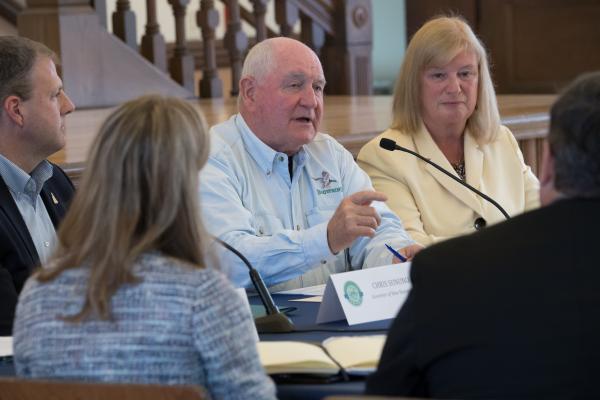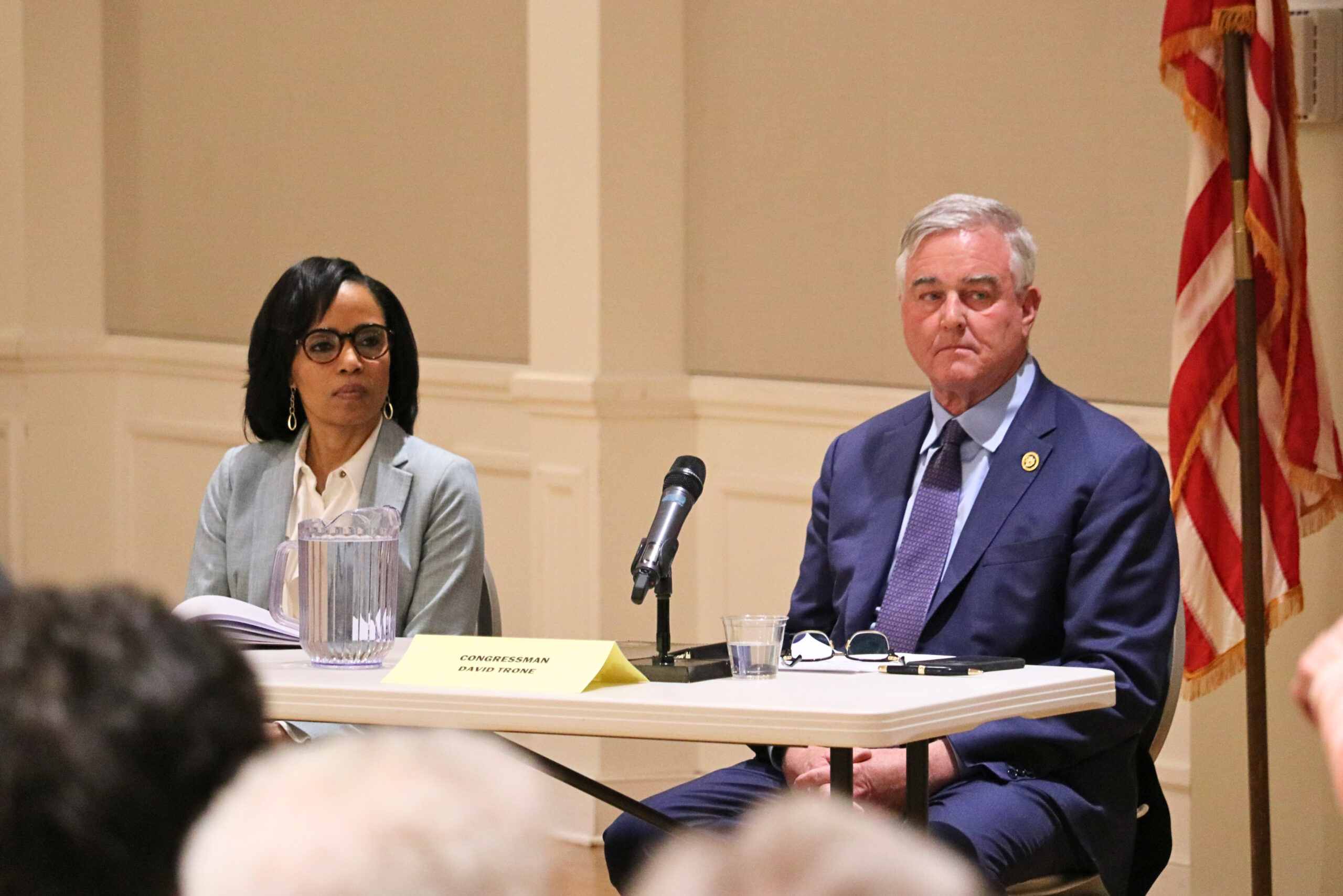Md. Lawmakers Fighting USDA Office Move Face Formidable Foes

Maryland Democrats are rushing to stop the Trump administration from moving two of the Agriculture Department’s scientific research agencies out of the Washington, D.C., region.
Lawmakers who oppose the plan are working against the clock to use legislative maneuvers to put the brakes on the administration’s plan to move the Economic Research Service (ERS) and the National Institute of Food and Agriculture (NIFA) to a new office in the Kansas City area by September.
Employees of the two agriculture research agencies – who live in Maryland, Virginia and D.C. – are trying to slow down the process. They face a choice: uproot their lives to move to Kansas City or lose their jobs.
The administration is pushing quick timelines to rush the move before the end of the fiscal year, Sept. 30. The details are still uncertain – Agriculture Secretary Sonny Perdue hasn’t even said whether the new location will be in Kansas or Missouri.
Meanwhile, lawmakers opposed to the move are using various tactics to try to block it. But it’s unclear whether they’ll be successful, leaving employees uncertain and worried about their futures.
House lawmakers are expected to soon pass a spending bill with language to keep the agencies in the Washington region. And senators from Maryland and Virginia are hoping to add a rider on the USDA offices to a must-pass defense bill.
The House Appropriations Committee included language in its 2020 spending bill for the Agriculture Department that would keep the agencies where they are. Democrats pushed for the rider despite GOP opposition. Every Republican from the House Agriculture Committee signed onto a letter to House Appropriators in March asking them not to block the potential move.
“Members from the National Capital Region are exploring all options to halt this relocation project, and will continue to work to prevent the USDA from moving forward,” House Majority Leader Steny H. Hoyer (D-Md.) said in an email this week. If allowed to go forward, Hoyer said the relocation would “disrupt the important work being done by scientists at both agencies, uproot families, and undermine morale.”
Maryland’s senators are also vying to keep the agencies in the region.
Democratic Sens. Ben Cardin and Chris Van Hollen are co-sponsors of legislation that would require the agencies to stay in the region. That bill has been filed as an amendment to the defense bill that is up next for debate in the Senate.
“Despite what USDA may think, this fight is not yet over,” said Sue Walitsky, a spokeswoman for Cardin.
But their efforts face significant challenges on the Senate side. Republicans largely support the administration’s plan to move the USDA agencies, particularly the senators from Kansas and Missouri. Sen. Roy Blunt (R-Mo.), a big supporter of the move to Kansas City, is on the Senate Appropriations agriculture subcommittee.
The massive defense authorization bill is expected to eventually make it to the president’s desk. So with gridlock on other action in Congress, the defense bill has become a vehicle for many lawmakers to try to get action on other proposals. Altogether, senators have filed nearly 400 amendments to the bill.
Sen. Mark Warner (D-Va.), who also opposes the USDA move, has placed a hold on the Trump administration’s nominee to oversee research and economics at the Agriculture Department. That hold will not in itself keep the agency from moving, but it puts some pressure on the administration to respond to lawmakers’ concerns.
Getting agencies out of Washington
The administration has touted the move as a cost-saving measure that will bring USDA research to the heartland and provide more affordable living and easy commutes for its employees. USDA estimates it will save $300 million over 15 years from employment and rent. ERS and NIFA currently rent office space alongside other federal leaseholders in Southwest Washington.
The two specialized agencies produce reports and give grants for other research groups. Since 1961, ERS has analyzed trends in agriculture, food and the environment. The hundreds of agricultural economists at the agency produce statistical reports and analyses for lawmakers, research institutions and decision-makers.
NIFA, established as part of the 2008 farm bill, oversees grants to scientists and research institutions across the country for agriculture research programs.
USDA’s push to move the agencies is part of a larger effort across the Trump administration to dismantle and reorganize parts of the federal government.
Shortly after Trump took office, he asked his agencies to look for ways to reorganize, with a directive to streamline the executive branch. The Interior Department is in the early phases of developing plans to move two of its agencies west. The White House and Congress are also at odds over the administration’s plans to eliminate the federal personnel agency, the Office of Personnel Management.
‘Like a bomb went off’
Employees from each agency recently unionized in response to the proposal. The local union representing the ERS sent a letter this week formally asking to bargain over the relocation and freeze further decisions on the move until the negotiations are complete.
“What upsets us is the secretary has shown no regard for employees and not acknowledged that our primary stakeholders are Congress,” said Laura Dodson, a union steward representing her colleagues at ERS.
ERS employees formed their union a month ago, and NIFA employees voted two days before the announcement to form a union. Many of them stood and turned their backs to Perdue as he announced the move.
The atmosphere at ERS has been gloomy since the announcement, according to Dodson. She has heard colleagues crying in their cubicles and concedes many colleagues are scrambling for work outside ERS. But jobs at the agency are considered hot commodities for such a specialized field.
“It feels like a bomb went off, everybody is shaken and on edge,” said Dodson. “We may not have luck in stopping this, but we are trying to at least slow this down. This is not how you move an agency.
“This almost guarantees that ERS will be a shell of its former self and will lose a lot of important agriculture research that is not duplicated in any land grant university.”
Agency employees received reassignment letters on June 13, notifying them that their jobs would move to Kansas City. They have until July 15 to accept or decline the offer. If they accept, they have to report to Kansas City by Sept. 30. If they decline, their employment will end on Sept. 27.
The administration will move 253 of the 329 ERS positions to Kansas City. Out of NIFA’s 315 positions, 294 will relocate while 21 will stay in the Washington area, according to USDA.
For Dodson, the move would be a personal loss. She grew up and attended college in Virginia, has family nearby, and enjoys the vibrancy and diversity of life in the city. She fears she would take a financial hit, too, in part because she’ll have to buy a car for her commute and would see a slight decrease in pay because of the way the federal government calculates cost-of-living pay adjustments.
Some agriculture research groups oppose the move, too. They argue that the agencies need to remain in Washington to be relevant to the lawmakers, agencies and other research groups who rely on them.
“We are really concerned that moving these agencies outside of Washington will dilute their voice to Congress, which could potentially dilute the voice these agencies have on behalf of farmers and people who eat, which is all of us.” said Rebecca Boehm, an economist who works on food and environment issues for the advocacy group Union of Concerned Scientists.
Allison Winter is a Washington, D.C., correspondent for The Newsroom.




 Creative Commons Attribution
Creative Commons Attribution